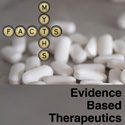In episode 87, Mike and James bring up the unlikely issue of likelihood ratios. As they knew they would likely have difficulty discussing this, they bring in the expert help of Bruce Arroll from New Zealand who really likes our podcast. We also like what he does as he has published so many useful articles in the area of rational therapeutics. However, at the end, the likelihood that any of this made sense is about 1.01, which is likely similar to the end result for most of the podcasts.
1) Simplifying Likelihood Ratios
For pre-test probabilities between 10% and 90% a positive test with an:
LR of 2 – increases the probability by 15% (absolute increases)
LR of 5 – increases the probability by 30%
LR of 10 – increases the probability by 45%
LR of 0.5 – decreases the probability by 15% (absolute decreases)
LR of 0.2 – decreases the probability by 30%
LR of 0.1 – decreases the probability by 45%
J Gen Intern Med 2002;17:647-50
2) Likelihood Ratio of a Positive Test Result
1-2 – “Poor”
2-5 “Small – Moderate”
5-10 “Good”
>10 “Excellent (Rule in)”
3) Likelihood Ratio of a Negative Test Result
1 – 0.5 “Poor”
0.5 – 0.2 “Small -Moderate”
0.2 – 0.1 “Good”
< 0.1 “Excellent (Rule out)”
4) Examples of some useful LRs
Phalen Test positive (Carpal Tunnel):
LR = 1.3
Shifting Dullness present (Ascites):
LR = 2.3
Patient Reporting Fever (>38 Temp):
LR = 4.9
Interstitial Edema on Chest X-Ray (CHF):
LR = 12.7
Ottawa Ankle Rules (Ankle #) negative:
LR = 0.08
Canadian C-Spine Rules (C-spine #) negative
LR = 0.013
(vs NEXUS LR = 0.25)
For children age 3-15 – throat swab for GABHS
LR +ve test = 2.9
LR -ve test = 0.04
JAMA 2000;283:3110-7
J Gen Intern Med 1988:423-8
Ann Emerg Med 1996:27:693-5
Am J Med 2004; 116: 363-8
BMJ 2003;326:417
NEJM 2003; 349: 2510-8
5) A clinical score to reduce unnecessary antibiotic use in patients with sore throat
CMAJ 1998;158:75-83


